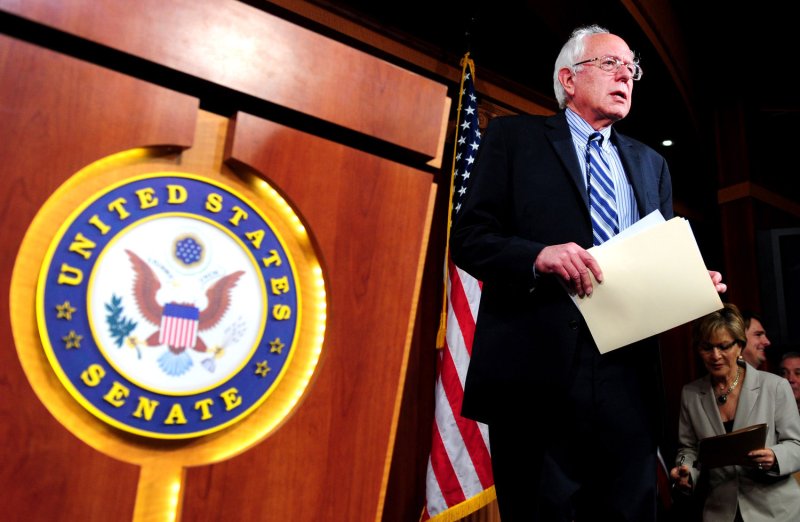Fidelity Investments: Average 401(k) balances roughly $77,000.
Sen. Bernie Sanders (I-VT) arrives for a press conference on Social Security in Washington. UPI/Kevin Dietsch |
License Photo
PRINCETON, N.J., May 23 (UPI) -- Pension plans can make all the difference in how financially well off U.S. retirees are, Gallup's annual Economy and Personal Finance survey indicates.
The survey of 2,000 U.S. adults, including 636 retirees, conducted April 4-14, indicated U.S. retirees with $50,000 or more in annual income were twice as likely as retirees below that threshold to have a work-sponsored pension plan as a major source of retirement funds.
Among all U.S. retirees, Social Security was most commonly -- 61 percent -- cited as a major source of retirement income followed by 36 percent who said pension plans were a major source, 23 percent who said 401(k), IRA or other retirement savings accounts, and 20 percent who said home equity.
Among wealthier retirees, Social Security was the next-most-common major source of funds, followed by self-directed retirement savings accounts such as 401(k) plans or IRAs, the survey said.
Seventy-three percent of retiree respondents below the median household income said they depended for most of their retirement income from Social Security.
Sixty-two percent of retirees age 70 and younger said Social Security was a major source of retirement funds, compared with 61 percent of retirees age 70 or older. Thirty-six percent of both age groups say pension plans were a major source of retirement income.
Data from Fidelity Investments, the largest holder of 401(k) plans, suggested investors' average 401(k) balance was about $77,000 at the end of 2012. For those nearing retirement age, these national average balances -- $77,000 -- will almost certainly be inadequate to fund their retirement, making them more dependent on Social Security, Gallup said.
The survey has a margin of error of 5 percentage points.
In a separate poll, Gallup said three-quarters of U.S. adult respondents said they believe they will work past the retirement age and more will do so because they want to than because they have to.
Gallup said an April 4-14 survey that 61 percent of respondents indicated they believed they would work part time past their retirement age, while 15 percent indicated they would work full time.
The remaining 24 percent, "don't intend to work or aren't sure," Gallup said.
But 40 percent of respondents indicated they would continue to work because they wanted to, while 35 percent indicated they would have to work past their retirement age.
Results of the second poll, which involved 1,005 adults, include a margin of error of 3 percent points, Gallup said.










